When I met Henry “Hank” Jacobs, I expected a straightforward interview about assisted living tips for seniors. What I didn’t expect was to be moved to tears by the depth of one man’s loss, strength, and pursuit of dignity.
At seventy-nine, Hank has lived a life many would call accomplished. A retired general contractor and commercial real estate developer, he spent decades building shopping centers, businesses, and community spaces. He prided himself on his craftsmanship, especially the personal projects that brought him happiness. He restored his historic home built in 1907 in Venice Beach, California and built park benches and a pet food pantry for a food bank in Monrovia, California where he also lived.

But in 2019, a massive stroke changed everything. “I used to fix everything with my hands,” he told me, voice steady but eyes softening. “And suddenly, I couldn’t even hold a coffee cup.”
After the stroke, Hank tried to stay in his home located against the San Gabriel Mountains. He hired caregivers, hopeful he could remain surrounded by the things and people he loved: his Gordon Setters, his neighbors, his front porch and the back patio where he drank coffee and watched the birds. But despite his best efforts, caregivers came and went. Health setbacks led to hospital stays. The independence he had slipped further away.

Eventually, with the help of a close friend, Hank relocated to Jacksonville, Florida, where he could receive better care. What followed, however, was not stability but a painful odyssey.
Several Moves in Six Years
Since 2019, Hank has lived in a few different assisted living communities. Each move came with hope that this one would be different.
“I’ve learned that promises don’t mean much unless they’re backed up,” he said. “They’ll tell you there’s twenty four hour nursing, personalized attention, gourmet food. But what you find might be a call button that connects to someone off-site and a reheated meals served from days before.”

And sometimes, it was worse than disappointment. It was danger. In August of this year, Hank was struck by a car in the parking lot of his then-community. It was a hit-and-run. He was rushed to the ER.
“No one from the ownership or leadership team ever followed up with me,” he said. “They just moved on. Like I didn’t matter.”
Despite the pain, he refuses to be bitter. Instead, he’s determined to share what he’s learned so that others might be spared the same grief.
Finding His Voice Again
The stroke didn’t just affect Hank physically. It took him years to rebuild his confidence and learn how to advocate for himself in a system that can be cold and clinical.
“I used to build things. Now I had to rebuild myself,” he said.

That strength shines through when he talks about the years he spent volunteering at The Unity Center Food Bank in Monrovia. Even after his stroke, he made sure the pet food bank he helped establish continued. He remembers the faces of the people he served
“I miss that work,” he said, quietly. “I miss being useful.
Today, Hank is cautiously optimistic. He recently moved into Grand Living at Tamaya, a community on the Southside of Jacksonville that, so far, feels promising. “It checks most of the boxes,” he said. “For now, it’s enough. Maybe I’ll get to celebrate my eightieth birthday here and feel at peace.”
When I asked what he’d share with others facing similar transitions, he didn’t hesitate. Here are his five hard-earned insights for choosing assisted living:
Hank’s Five Things to Know Before Choosing An Assisted Living Community
1. Don’t Believe the Brochure: “Visit in person during dinner and on the weekends. See how the staff interact with residents. Your gut will tell you more than the photos.“
2. Staff Turnover Speaks Volumes: “High turnover is a major red flag. You want people who know your name, your needs, your story.“
3. Talk to the Residents, Not Just the Staff: “The marketing person has a job to sell you. But residents tell you the truth. Ask them how they feel. Talk to their family members.”
4. Look for the Little Things: “It’s not about chandeliers or paint colors. Look at the trash cans. Are they overflowing? Are the bathrooms clean? Are call buttons answered quickly?”
5. Speak Up. This Is Your Home: “It took me a long time to find my voice again. But you’re not a guest paying thousands a month. It’s your home. You deserve to feel safe and valued. Don’t stay silent.”
More Than Just Survival
Hank’s story is more than a cautionary tale. It’s a reminder of something deeper: that home isn’t just a building. It’s a feeling. A sense of belonging. A place where you are known.
As more adults consider assisted living or support loved ones making that transition, stories like Hank’s matter. Before we said goodbye, I asked him what he dreams about these days.
“I dream about my dogs. My backyard in Monrovia. The sun hitting the patio just right. And I dream about being able to sit on a porch again, coffee in hand, and finally feel like myself.”
If you are exploring assisted living options, take your time. Ask questions. Because, as Hank reminds us, it’s not just about finding a place to stay. It’s about finding a place to belong.






